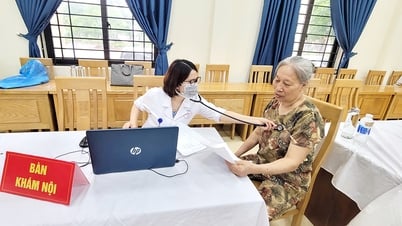Recently, doctors at Thanh Hoa General Hospital performed emergency surgery and transfused 28 units of blood to save the life of a pregnant woman in critical condition due to uterine atony and severe hemorrhage after a cesarean section at a medical facility.

Doctor examines patient D.TMT 4 days after surgery.
The patient is a pregnant woman, D.TMT, 25 years old, residing in Vinh Loc district, who had a second cesarean section at a medical facility. After giving birth, the mother had continuous vaginal bleeding, with a large volume (about 3,000 ml). The patient was transferred to the emergency room at Thanh Hoa General Hospital in a very critical condition, comatose, with symptoms of hypovolemic shock, rapid pulse, low blood pressure, pale skin, pale mucous membranes, distended abdomen, blood seeping through the surgical wound, very high doses of vasopressors, and balloon ventilation through an endotracheal tube. The on-call team quickly prescribed drugs to increase contraction and stop bleeding, but there was no response.
Assessing that this was a dangerous obstetric accident, the patient's condition was rapidly progressing, complicated and could die immediately if he did not receive timely surgery to stop bleeding and blood transfusion, the doctors at the Emergency Center transferred the patient directly to the emergency operating room of the Anesthesia and Resuscitation Department, and at the same time, a team of doctors from the Emergency Department, Abdominal Surgery, Anesthesia and Resuscitation, and Hematology and Blood Transfusion were urgently invited to participate in the surgical consultation.
Talking with Dr. Hoang Manh Hong, Head of the Department of Anesthesia and Resuscitation - Head of the Surgical Anesthesia Team, treatment and intensive care after surgery for the patient said: This is a case of very severe hemorrhage, the patient lost nearly 2/3 of her blood volume, had cardiovascular collapse, and acute respiratory failure. When transferred, the doctors consulted and the prognosis was extremely poor, with a high risk of death. The team of doctors performed a total hysterectomy, hemostasis, and performed emergency resuscitation techniques, blood transfusions and blood products for the patient to quickly compensate for the lost blood volume. Blood was urgently mobilized from the Blood Bank of the Hematology and Blood Transfusion Center, Thanh Hoa Provincial General Hospital and from a platelet donor to transfuse to the pregnant woman.
Within 12 hours before, during and after the surgery, the patient was transfused a total of 28 units of blood (nearly 7 liters) including blood and blood products. This is one of the cases requiring the largest amount of emergency blood transfusion at Thanh Hoa General Hospital to date.

Patient Đ.TMT received blood transfusion and special care after surgery in the Anesthesia and Resuscitation Department.
After surgery, the patient is still in critical condition, with hemorrhagic shock and severe blood clotting disorder, threatening his life. The patient faces many risks, the most dangerous of which is the risk of cerebral hemorrhage due to blood clotting disorder or brain cell damage due to lack of oxygen.
To ensure the patient's life safety, the post-operative resuscitation team of the Anesthesia and Resuscitation Department closely monitored and continued to actively resuscitate the patient, ensuring respiration, circulation, blood transfusion, plasma transfusion, use of drugs to regulate blood clotting disorders, etc.
On the second day after surgery, the patient's blood clotting disorder improved, the patient was able to move his limbs and open his eyes when pinched. With the close coordination of specialists, especially the active monitoring and treatment after surgery by the team of doctors from the Anesthesia and Resuscitation Department, the patient overcame the "near-death" situation to the overwhelming happiness of his family and the medical team.
Currently, after 4 days of emergency care and intensive treatment, the patient is awake, has had the endotracheal tube removed, is breathing well on his own, has stopped vasopressors, does not require blood transfusion, the surgical wound is dry, tests are within normal limits, and his health is stable.

Currently, patient D.TMT continues to be monitored and provided with comprehensive care.
Postpartum uterine atony is a condition in which the uterus cannot contract after childbirth, which is the leading cause of very dangerous postpartum hemorrhage, threatening the mother's life. Normally, the uterine muscles will automatically tighten or contract to separate the placenta after birth. This contraction process helps tighten the blood vessels attached to the placenta and helps prevent bleeding. In cases where the uterine muscles do not contract strongly enough, blood continues to flow freely, leading to hemorrhagic shock and blood clotting disorders. If not treated promptly, it will endanger the mother's life.
Uterine atony is an obstetric complication that occurs suddenly and without warning signs. However, thanks to advances in medicine as well as adequate knowledge about pregnancy and childbirth, pregnancy complications will be controlled and greatly reduced. Doctors recommend that pregnant women fully perform the regular prenatal check-up schedule, especially 3 times during pregnancy in the first 3 months, middle 3 months and last 3 months. Perform necessary examinations, ultrasounds, and tests to screen for fetal malformations and abnormalities if any. It is necessary to supplement iron and folic acid as directed by the doctor to prevent anemia. Have a nutritious diet, rest, and light work. When there is one of the following abnormal signs: abdominal pain, vaginal discharge, vaginal bleeding, headache, dizziness, lightheadedness, weak fetal movement, pain in the side or difficulty breathing... go to a medical facility immediately for timely examination and treatment.
To Ha
Source



































































































Comment (0)